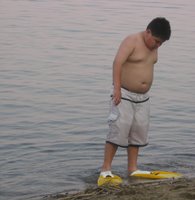George is a sweet kid who was homesick on the first day. He quickly warmed up to us, especially Rachel, and was the most smile-y of all the kids. Here he is with a pudding mustache.
 Nikki has been coming to ABI camp for years. This year she took a huge step and shared her story with everyone at camp. When she was three, she was hit by a drunk driver while she was walking outside. Despite her challenges, she’s very positive and has a strong faith in God. Here, she’s dressed up for our Fairy Tale Banquet.
Nikki has been coming to ABI camp for years. This year she took a huge step and shared her story with everyone at camp. When she was three, she was hit by a drunk driver while she was walking outside. Despite her challenges, she’s very positive and has a strong faith in God. Here, she’s dressed up for our Fairy Tale Banquet. Jesse was quite a challenge at times – he has a rebellious exterior, but he’s a softie inside. He liked to push the limits, but he was loveable, as this picture shows.
Jesse was quite a challenge at times – he has a rebellious exterior, but he’s a softie inside. He liked to push the limits, but he was loveable, as this picture shows. Bradly is probably every staff member’s favorite kid. His brain injury causes him to speak very slowly, one word at a time. But he’s got a killer sense of humour and a wit that’s quicker than his mind can process – and the jokes seem even funnier because they come out slowly. "You're...going...down...Rachel!"
Bradly is probably every staff member’s favorite kid. His brain injury causes him to speak very slowly, one word at a time. But he’s got a killer sense of humour and a wit that’s quicker than his mind can process – and the jokes seem even funnier because they come out slowly. "You're...going...down...Rachel!" Here’s Dorion. He was a soft-spoken kid who was homesick one night. We read him Robert Munsch books to take his mind off of it. Then he went to bed, and we kept reading Robert Munsch books…
Here’s Dorion. He was a soft-spoken kid who was homesick one night. We read him Robert Munsch books to take his mind off of it. Then he went to bed, and we kept reading Robert Munsch books… Finally, Kim. She probably faced the most physical challenges out of all the kids. She’s in a motorized wheelchair (she’s a much better driver than me), she can’t speak, and she has a worker who takes care of her 24-7. But like Bradly, she had a great sense of humour expressed without words, and a love and talent for art, and it was a joy to be around her. Here she is messing up Claire’s hair and loving it!
Finally, Kim. She probably faced the most physical challenges out of all the kids. She’s in a motorized wheelchair (she’s a much better driver than me), she can’t speak, and she has a worker who takes care of her 24-7. But like Bradly, she had a great sense of humour expressed without words, and a love and talent for art, and it was a joy to be around her. Here she is messing up Claire’s hair and loving it! So ABI was awesome. In other news, I’ve been doing a lot of thinking about art – music, movies, and books especially – and how Christians should interact with it. We’ve recently removed our rule at camp about only listening to “Christian” music and replaced it with a rule restricting any media with profanity, sexual content, or drug / alcohol glorification. I think this is a positive step, since the “Christian label” thing is so artificial, and (as is often mentioned at Regent) “Christian” shouldn’t really be used as an adjective anyway. All beauty is God’s beauty, and all truth is God’s truth.
So ABI was awesome. In other news, I’ve been doing a lot of thinking about art – music, movies, and books especially – and how Christians should interact with it. We’ve recently removed our rule at camp about only listening to “Christian” music and replaced it with a rule restricting any media with profanity, sexual content, or drug / alcohol glorification. I think this is a positive step, since the “Christian label” thing is so artificial, and (as is often mentioned at Regent) “Christian” shouldn’t really be used as an adjective anyway. All beauty is God’s beauty, and all truth is God’s truth.I think the new content-based rule is good for camp, where we’re responsible for making choices on behalf of the children in our care, and must not go against their parent’s wishes for what they should see or hear. However, some people I’ve been talking to about this have made it clear that they think this “profanity, sex, drugs” criteria should be used as an automatic filter for everything Christians take in, no matter their age. In other words, we shouldn’t be listening to any music or watching or reading anything containing these things, in the interest of purity, so as not to defile our bodies, the Temples of the Holy Spirit.
But can taking in these things actually defile us? This is a question I haven’t really asked. I came across an interesting article online by someone named Matt Oquist. I’m not sure I agree with all of it, but it was definitely thought-provoking, especially where he discusses whether pondering or observing impurity can make us impure. He points out that we misinterpret Phil. 4:8 (whatsoever things are true, honest, just, pure, etc.) by using it to filter out the set of topics we shouldn’t think about. If something fails on one point, it is unfit for thought. Yet this really doesn’t make sense, because if we applied this to everything, we wouldn’t be able to think about many passages of Scripture, which describe people doing impure, unjust, dishonest things, and we wouldn’t be able to think about hell or sin as doctrines.
He also talks about what Jesus says in Mark 7, where he talks about being defiled not by what a person takes in from outside, but what comes from within a person. He says that this means we can’t be defiled by what we observe, but this doesn’t mean it won’t cause us to respond in a sinful way. Is this splitting hairs? Here’s In his words, "although the act of observing an evil thing never in itself makes a Christian impure, many things we can observe may cause subsequent evil things to come from within us. So it is never biblical to say "Christians shouldn’t think about topic X or observe topic Y", but it is biblical to realize that "I have a weakness, and to avoid sin I shouldn’t dwell on topic X at this point in my life".
While Oquist is careful to say that he’s not implying that observing sin is valuable, he thinks it can be permissible if there is another purpose. For example, Jesus hung out with the scum of society, and probably observed many sinful acts. This was permissible because of the more important issue at stake: establishing relationships with them.
I’d love to hear some feedback about this. I haven’t asked you for feedback for a while, so it’s high time. If you’d like to read the whole article, go to: http://www.css.taylor.edu/~moquist/ca.pdf .
Well, I have to wake up at 4:20 AM to drive my parents to the airport, so I should probably get a little sleep. Pray for staff training and MDT this week!
No comments:
Post a Comment